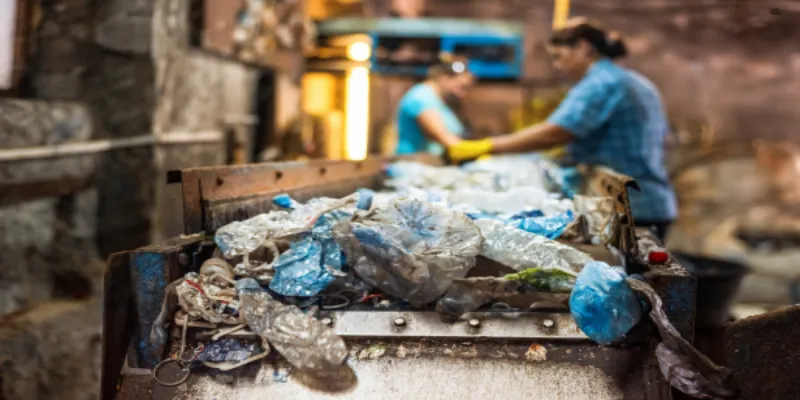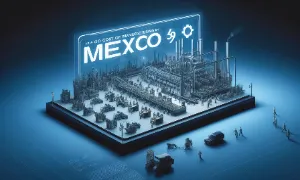
Mexico's manufacturing sector has long been one of the pillars of the nation's economy. This sector encompasses a wide range of industries, from automotive and aerospace to electronics and textiles, with the plastic manufacturing industry emerging as a particularly dynamic component. Plastics play a crucial role in packaging, automotive components, construction materials, and consumer goods, linking the industry's health directly to these major economic segments. As global demand for lightweight, durable, and cost-effective materials increases, Mexico’s plastic manufacturing industry not only supports domestic growth but also positions itself as a critical supplier in international markets, enhancing its influence and importance within the national economy.
In this blog post, we are exploring the various opportunities within Mexico’s burgeoning plastic manufacturing industry.
Mexico's Plastic Manufacturing Edge: Key Opportunities
Mexico's plastic manufacturing industry presents numerous opportunities due to its strategic location, strong trade agreements, and growing domestic market. Here are some key opportunities in this sector:
-
Strategic Location
Mexico's proximity to the United States and Canada, under the USMCA (United States-Mexico-Canada Agreement), offers significant advantages for export-oriented businesses. This geographic advantage facilitates lower transportation and logistics costs for companies targeting North American markets. -
Growing Domestic Market
Mexico's domestic market is expanding with increasing consumer demand for plastic products used in various industries such as automotive, packaging, and construction. This growth is driven by urbanization and increases in disposable income. -
Advanced Manufacturing Capabilities
Mexico has been developing its manufacturing capabilities and infrastructure, which now include high-tech plastic manufacturing processes like injection molding, extrusion, and blow molding. This evolution positions Mexico as a competitive player in high-quality plastic production. -
Focus on Sustainable Practices
There is a growing trend towards sustainability in the plastics industry globally, and Mexico has the opportunity to lead in this area by investing in recycling technologies and the production of bioplastics. This shift is increasingly demanded by both consumers and international regulatory standards. -
Government Incentives
The Mexican government offers various incentives for manufacturers, including tax breaks and subsidies, especially for companies that invest in technology and sustainable practices. These incentives can reduce the initial capital required and boost profitability. -
Export Opportunities
Besides the advantages of NAFTA/USMCA, Mexico has trade agreements with over 50 countries, opening vast opportunities for exports. This extensive network allows Mexican plastic manufacturers to access global markets more easily and competitively. -
Skilled Workforce
Mexico continues to invest in education and vocational training, particularly in engineering and manufacturing disciplines. This investment ensures a steady supply of skilled workers to support the industry.
These opportunities highlight the potential for growth and profitability in Mexico's plastic manufacturing industry, making it an attractive option for investors and companies looking to expand their operations in the Americas. Must-see: Costs of Manufacturing in Mexico.
Challenges in Mexico's Plastic Manufacturing Industry
Despite the significant opportunities within Mexico's plastic manufacturing industry, several challenges could impact its growth and stability. Addressing these potential obstacles is crucial for stakeholders looking to capitalize on the industry's potential:
- Political Instability: Mexico has experienced periods of political unrest and policy shifts that can affect investor confidence and the regulatory environment. Changes in government often lead to changes in industrial policies, which can impact the business landscape, potentially making it less predictable. Manufacturers may face uncertainties regarding future regulations, taxation, and government support for the industry.
- Economic Fluctuations: Like many emerging markets, Mexico's economy can be subject to volatility. Economic downturns, inflation, or currency fluctuations can significantly impact manufacturing costs and profit margins. Since the plastic industry heavily relies on raw materials and energy, any changes in these costs can have a ripple effect throughout the sector.
- Global Market Conditions: The global nature of the plastics market means that Mexico's industry is not only influenced by local but also international economic conditions. Trade wars, global supply chain disruptions, and changes in foreign markets can all affect Mexican plastic manufacturers. For instance, a downturn in the automotive industry in the U.S. would directly impact the demand for automotive plastics produced in Mexico.
- Environmental Regulations: As global awareness of environmental issues grows, the plastic manufacturing industry faces increasing pressure to adopt sustainable practices. New regulations aimed at reducing plastic waste and promoting recycling can impose additional costs on manufacturers. Adapting to these changes requires investment in new technologies and processes, which can be a significant hurdle for some companies.
- Competition from Other Countries: Mexico faces stiff competition from other countries in plastic manufacturing, particularly from Asian markets like China, which often have lower labor and production costs. To remain competitive, Mexican companies need to invest in technology and improve their operational efficiencies, which can require substantial capital.
- Infrastructure Challenges: While Mexico has made significant improvements in its manufacturing infrastructure, there are still areas where infrastructure is lacking, particularly in transportation and logistics. This can affect the efficiency of supply chains and increase operational costs, particularly for industries reliant on the timely and cost-effective transport of raw materials and finished products.
Legal and regulatory considerations
For businesses operating in or considering entry into Mexico’s plastic manufacturing industry, navigating the legal and regulatory landscape is crucial. These considerations not only affect day-to-day operations but also play a significant role in strategic planning and long-term viability. Here are some key legal and regulatory aspects to consider:
- Environmental Compliance: The plastic industry is under increasing scrutiny for its environmental impact. In Mexico, manufacturers must comply with local and federal environmental regulations, which include waste management, emissions standards, and recycling mandates. Failure to comply with these regulations can result in hefty fines, legal sanctions, and reputational damage. Companies need to stay informed about current and upcoming legislation, such as bans on single-use plastics, which are becoming more common in various states across Mexico.
- Product Safety and Quality Standards: Mexican authorities enforce strict product safety and quality regulations to ensure that manufactured goods meet certain standards before they can be sold domestically or exported. Compliance with these standards is mandatory for maintaining market access and consumer trust. This includes adherence to international standards, which can facilitate easier access to global markets under trade agreements like the USMCA.
- Intellectual Property Protection: Protecting patents, trademarks, and copyrights is vital in the competitive environment of plastic manufacturing. The Mexican legal system provides mechanisms for protecting intellectual property (IP), but navigating the IP landscape can be complex. Manufacturers should secure their innovations through registered patents and trademarks to avoid infringement issues and ensure a competitive edge.
- Labor Laws: Mexico has specific labor laws that businesses need to comply with, including regulations regarding wages, working hours, and employee benefits. Recent reforms have focused on strengthening workers' rights, enhancing union transparency, and ensuring fair labor practices. Companies must be aware of these laws to avoid legal disputes and ensure a harmonious workplace. Here you must read: Mexico's Labor Laws.
- Trade Regulations and Customs: Being a major player in international trade, Mexico has established various trade laws and customs regulations that affect how plastic products are imported and exported. Understanding these regulations is crucial for smooth cross-border trade operations. This includes tariffs, trade barriers, and compliance with the rules of origin stipulations set forth in international trade agreements.
- Corporate Governance and Tax Compliance: Adhering to Mexican corporate governance standards and tax obligations is essential for any business. This includes regular financial reporting, paying corporate taxes, and meeting any sector-specific fiscal obligations. Mismanagement in these areas can lead to legal penalties and affect business operations.
By thoroughly understanding and respecting these legal and regulatory frameworks, companies in Mexico's plastic manufacturing industry can better position themselves for sustainable growth, risk management, and competitive advantage. It's advisable for businesses to engage with legal experts and consultants who specialize in Mexican corporate and environmental law to navigate these complexities effectively.
Harnessing Mexico's Plastic Manufacturing Opportunities with SIXM
Mexico's plastic manufacturing industry offers a wealth of opportunities, fueled by its strategic location, advanced manufacturing capabilities, and a robust legal framework. Mexico Manufacturing Consulting Services are essential for those considering investing, expanding operations, or starting new initiatives in this vibrant sector. The potential for growth and success is substantial. Navigating the challenges will be crucial, but with the right strategies and a focus on sustainability and innovation, businesses can effectively capitalize on these opportunities. With careful planning and strategic investment, companies like SIXM can thrive, harnessing the strengths of Mexico's dynamic manufacturing landscape to forge a path toward innovation and profitability in the plastic industry.
Sources
What is Intellectual Property?
United States-Mexico-Canada Agreement.
Plastic Pollution Policy Country Profile: Mexico.

